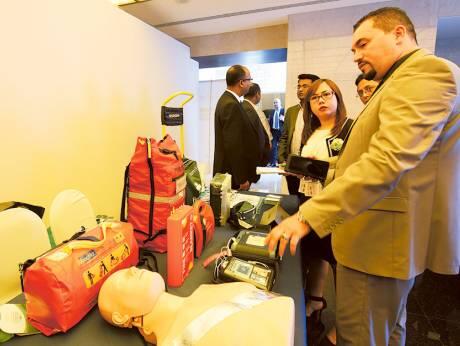A chapter on marina fires and another on solar power-related standards and firefighting techniques will be part of the amended UAE Fire and Life Safety Code 2016, expected to be out by the end of the year, officials said at a conference on Tuesday.
Brigadier Ahmad Obaid Al Sayegh, Deputy Director of Dubai Civil Defence, told Gulf News on the sidelines of the seventh Annual Middle East FireSafe Summit, that the chapter on marina fires was included following two serious incidents.
“Every two years, the committee [working on the UAE Fire and Life Safety Code] meets, renews and amends the code. When renewing the code, we take into consideration the recent incidents, and in this case it was the two fires that took place in yachts docked at marinas — one in Ajman and the other in Abu Dhabi — and that is why we need to put regulations to ensure people are safe in similar situations in the future,” he explained.
As for cladding, he said, incidents taking place because of the use of the material have been very serious, “but thanks to god’s grace, the readiness of Civil Defence teams and the fire protection systems in buildings, there have been no fatalities.”
He said a committee formed two days after the Address Downtown fire, on orders from Lt-General Shaikh Saif Bin Zayed Al Nahyan, Deputy Prime Minister and Minister of Interior, to check all buildings in the UAE especially for flammable cladding and for any other discrepancies, has been working tirelessly and has banned flammable cladding materials, which will be included in the new code.
“The materials have been specified and will soon be announced when the code is released. We are now working on applying the new regulations in buildings that have already been approved, and trying to reach a middle ground that does not compromise people’s lives, but also bears in mind the extra costs the construction companies [have to incur] to make those buildings compliant with the new code,” Brig Al Sayegh said.
Parmod Challa, senior engineer at the Safety Department at Dubai Civil Defence, said that with the Dubai Electricity and Water Authority (Dewa) moving towards solar energy, they see a need to include a chapter in the UAE Fire and Life Safety Code 2016 to ensure there is a standard which includes solar plants and installations.
“The standards for the materials used are also the key here. Before, the materials used in solar panels were flammable and produced toxic gases when it was on fire. Now it has been refined, even the international standard has been revised to address this,” he said.
Adding that the technique to fight fires involving solar panels is different, he said there is a need to train firefighters continuously in such new techniques.
The code includes information on how to correctly install solar panels on roof.
On the topping of cladding, Pramod said that this section has been revised around 17 times during the process of drafting the code.
“The test standards and requirements for cladding have been revised in coordination with industry experts, fire engineers, test laboratories and people who supply the materials and certification bodies,” he said.
“In my opinion, this is the best that we can offer to the industry as of now. But if there are research results or white papers published later, we have to adopt [their recommendations] and make amendments,” Challa said.
He added that the code is currently in the translation phase, and should be ready before the end of the year.
The new code will also have clearer 3D diagrams as opposed to the 2D ones in the old code, and has a very detailed chapter on who would be held responsible for what in fire incidents.
Civil Defence to outsource inspection
Dubai: Dubai Civil Defence is working on a new concept where a private agency assigned by the department will take video recording of building inspections, and send the same to it for approval.
Parmod Challa, senior engineer at the Safety Department at Dubai Civil Defence, said “remote inspection” is something they intend to do and are working on and that has been outlined in the soon-to-be-released amended UAE Fire and Life Safety Code 2016.
“We will have the whole process filmed [by the agency] and then it send it [the footage] to the Civil Defence. The footage could be used for engineer trainings or for obtaining No objection Ceritification (NOC) for the buildings,” he said.
Dubai Civil Defence will specify to the private agency how it wants the videos to be made. “The consultant is still responsible, he should take the videographer around for the commissioning process and the agency will film it and send it to Civil Defence,” he said
However, he said, the department cannot depend on the consultants to send reliable videos, “We want to see the day where we will not be part of this and the industry will raise its bar to that level,” but for now, he said this is a good step that he hopes will work.
Challa also said that in the coming month, all consultants will be required to undergo certain training and certifications to be eligible to work with the Civil Defence on anything or get approvals.
Source: Gulf News











